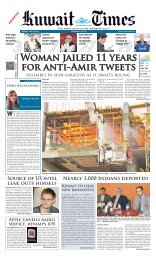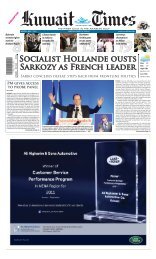ARAb StAtES diSMAyEd At WESt'S cOMPlAcENcy - Kuwait Times
ARAb StAtES diSMAyEd At WESt'S cOMPlAcENcy - Kuwait Times
ARAb StAtES diSMAyEd At WESt'S cOMPlAcENcy - Kuwait Times
Create successful ePaper yourself
Turn your PDF publications into a flip-book with our unique Google optimized e-Paper software.
SATURDAY, MAY 4, 2013<br />
BUSINESS<br />
Westpac posts record first-half profit<br />
SYDNEY: Australian heavyweight<br />
Westpac Banking Corporation Ltd yesterday<br />
reported a better-than-expected 11<br />
percent increase in first-half net profit to a<br />
record Aus$3.3 billion ($3.4 billion) as it<br />
chases growth. The country’s second<br />
largest bank by market capitalisation said<br />
cash earnings, the preferred measure<br />
which strips out volatile items, were up 10<br />
per cent to Aus$3.53 billion against the<br />
first half last year. Analysts had forecast<br />
cash profit of Aus$3.47 billion for the six<br />
months to March 31.<br />
The bank noted that all its Australian<br />
businesses produced double-digit cash<br />
earnings growth and costs had also been<br />
reduced. Despite the record results, chief<br />
executive Gail Kelly said: “The operating<br />
environment continues to be challenging,<br />
with subdued lending growth. “However,<br />
in line with our strategy, we are actively<br />
targeting opportunities in higher growth<br />
areas where conditions are more<br />
favourable such as deposits, wealth, trade<br />
finance and natural resources.”<br />
“Momentum continued to build over<br />
the period, with all our Australian businesses<br />
producing double-digit cash earnings<br />
growth,” she said. Westpac said lending<br />
increased three percent to $15 billion,<br />
driven by Australian housing loans.<br />
Customer deposits soared 12 percent to<br />
$360 billion. “However you look at the<br />
headline numbers from Westpac this<br />
morning, they can only be seen one wayinvestor<br />
pleasing,” said IG market strategist<br />
Evan Lucas.<br />
Kelly said that Westpac’s capital<br />
strength helped it to pay a higher interim<br />
dividend of Aus$0.86 per share as well as<br />
a surprise special dividend of Aus$0.10. In<br />
early deals, Westpac shares rose but, IG<br />
market strategist Stan Shamu explained,<br />
it “turned negative as short-term traders<br />
who had positioned themselves for a<br />
monster result by the bank locked in<br />
gains”. Westpac shares closed down one<br />
percent at $33.55 while the benchmark<br />
ASX200 index was flat on 5,130 points.<br />
The results followed rival ANZ’s record<br />
$2.94 billion half-year net profit posted<br />
earlier this week. A rally in Australian bank<br />
shares in the past 12 months has pushed<br />
the market value of Westpac above $100<br />
billion with some analysts warning of a<br />
possible bubble in the sector. — AFP<br />
LONDON: State-backed Royal Bank of<br />
Scotland yesterday pushed for the<br />
British government to start selling its 82<br />
percent stake as early as next year even<br />
though it could mean a loss for taxpayers.<br />
Chairman Philip Hampton said the<br />
aim was to have a business in strong<br />
enough shape to start preparing a<br />
prospectus with the government for a<br />
sale from the middle of 2014. “It could<br />
be earlier, that’s a matter for the government,”<br />
Hampton said in an interview on<br />
the bank’s website.<br />
Britain pumped 45.5 billion pounds<br />
($71 billion) into RBS during the 2008<br />
financial crisis, leaving the government<br />
with a controlling stake. The bank has<br />
been through a big restructuring - shedding<br />
underperforming assets and cutting<br />
jobs. It reported its first quarterly<br />
profit in 18 months yesterday. But taxpayers<br />
are still sitting on a paper loss of<br />
19 billion pounds, based on RBS’s current<br />
share price.<br />
The government is keen to start selling<br />
its holding but is under pressure to<br />
get a good deal for taxpayers ahead of a<br />
general election in 2015. RBS is pushing<br />
LONDON: A blue sky over the headquarters of RBS Bank is seen yesterday. — AFP<br />
RBS eyes return<br />
to private sector<br />
RBS to show first profit in 18 months<br />
for a sale so it can run its business without<br />
state interference. Hampton has said<br />
the bank needed freedom to execute its<br />
recovery plan without political meddling.But<br />
rival Lloyds Banking Group, 39<br />
percent state-owned after a bailout in<br />
the crisis, could prove a more attractive<br />
business to sell. Lloyds reported a big<br />
jump in first quarter profit on Tuesday,<br />
pushing its shares close to a price where<br />
the government could break even if it<br />
sold out. Sources with knowledge of<br />
government plans told Reuters a sale of<br />
shares in RBS or Lloyds in 2014 was realistic.<br />
A decision would depend ultimately<br />
on the share performance of the two<br />
banks in the interim and whether the<br />
government would sell at a loss, the<br />
sources said. Other factors affecting the<br />
decision included the outcome of talks<br />
on capital requirements between the<br />
banks and Britain’s financial regulator<br />
and a review into banking standards by<br />
a parliamentary panel. The Treasury and<br />
UK Financial Investments (UKFI), which<br />
manages the government’s stakes,<br />
declined to comment.<br />
RBS Chief Executive Stephen Hester<br />
said the government might have to take<br />
a loss initially when it starts selling, given<br />
the depressed state of bank shares<br />
and tougher regulation of the industry.<br />
But he expected the UK taxpayer to<br />
make a profit in the long run. “There<br />
may well be a cogent case for starting at<br />
a lower price but I believe the average<br />
(sale) price can, and should, be above<br />
the government purchase price,” Hester<br />
told reporters.<br />
RBS shares were down 5.7 percent to<br />
290 pence at 1200 GMT, well below the<br />
407 pence mark which the government<br />
regards as its buy-in level. Under<br />
Hester, RBS has shed around 900 billion<br />
pounds in assets and is focusing on<br />
lending to British households and small<br />
businesses. He said the bank was starting<br />
to see a pick-up in loan demand,<br />
echoing comments from Lloyds, which<br />
said its core loan book had returned to<br />
growth quicker than expected. The<br />
long-term prospects for RBS and Lloyds<br />
are closely linked to Britain’s economy<br />
as their domestic focus means profitability<br />
will be constrained until UK<br />
growth picks up. —Reuters<br />
Economist to<br />
lead Canada’s<br />
central bank<br />
OTTAWA: The Bank of Canada on Thursday named an economist<br />
and longtime bureaucrat, Stephen Poloz, as its new governor,<br />
succeeding Mark Carney who is leaving to head the<br />
Bank of England next month. Poloz has worked in Canada’s<br />
public service for 25 years, including since 2011 as chief executive<br />
of Canada’s export credit agency, which helps Canadian<br />
exporters and investors expand their international business.<br />
“Mr. Poloz has significant knowledge of financial markets and<br />
monetary policy issues and extensive management experience,”<br />
David Laidley, chair of the bank’s search committee<br />
said in a statement.<br />
“We are confident Mr Poloz will make an outstanding contribution<br />
to the work of the bank and uphold its reputation as<br />
a leading central bank.” Poloz starts his new job on June 3, for<br />
a seven-year term, hinting on Tuesday at a press conference<br />
that he intends to stay the course on monetary policies set by<br />
his predecessor. During his term, Carney lowered the bank’s<br />
key interest rate to a near record low of 1.0 percent-where it<br />
still stands-in hopes of keeping the Canadian economy afloat<br />
during the worst global economic and financial upheaval in a<br />
century. “The global economy still has its fragilities or issues<br />
that it faces, so we aren’t out of the woods yet, and Canada<br />
will feel all of those shocks as they occur,” Poloz said.<br />
“But I think the framework that we work with here has<br />
proved itself very well and so I think we’re well equipped to<br />
press forward.” Analysts quickly noted that Poloz has otherwise<br />
not commented on monetary policy for some time and<br />
so it is hard to judge how he perceives the current central<br />
bank stance.<br />
Even so, the Bank of Canada’s rate decisions are taken by<br />
consensus by its governing council and so most analysts<br />
expect rates to remain at their current levels for now. Nomura<br />
bank analyst Charles St-Arnaud of Nomura bank commented<br />
that as chief economist at Export Development Canada, Poloz<br />
worked “intensely on the productivity and competitiveness<br />
issues that have been plaguing the Canadian economy over<br />
the past decade.”<br />
“This could be important given that the recent Bank of<br />
Canada forecast pegged a lot of hope on an export-led recovery,”<br />
he said. Citing a report released by Export Development<br />
Canada, Poloz told reporters to expect “pretty strong growth”<br />
in Canadian exports in the coming year as the recovery in the<br />
United States, Canada’s largest trading partner, picks up. He<br />
also noted that since 2008 many small companies in Canada<br />
had folded. “What we’re looking for now is the resumption of<br />
creation of new companies, and that is just beginning.”<br />
“So the supply side of the economy is also in a rebuilding<br />
phase,” he said. A native of Oshawa, Ontario, Poloz graduated<br />
from Queen’s University in 1978 with a bachelor’s degree in<br />
economics, and subsequently received a master’s degree and<br />
a PhD in economics, both from the University of Western<br />
Ontario. He worked for Canada’s central bank from 1981 to<br />
1995, occupying increasingly senior positions including chief<br />
of the research department. He then spent five years with<br />
Montreal-based BCA Research before returning to the public<br />
sector. Finance Minister Jim Flaherty pointed to Poloz’s<br />
decades of experience in financial markets, forecasting and<br />
economic policy, to say: “I am confident he has the skills and<br />
experience required to lead the Bank of Canada at a time of<br />
global economic uncertainty.” Poloz said his appointment as<br />
the central bank’s ninth governor was both “an honor and a<br />
privilege.” — AFP
















